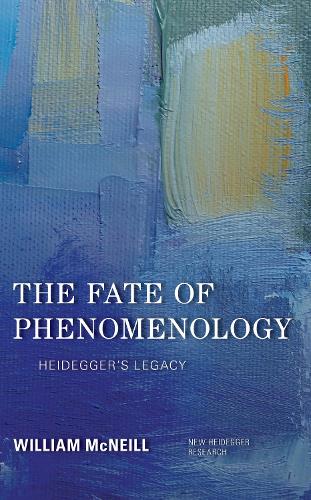
The Fate of Phenomenology: Heidegger's Legacy
(Hardback)
Publishing Details
The Fate of Phenomenology: Heidegger's Legacy
By (Author) William McNeill
Bloomsbury Publishing PLC
Rowman & Littlefield International
22nd July 2020
United Kingdom
Classifications
Professional and Scholarly
Non Fiction
193
Physical Properties
Hardback
168
Width 161mm, Height 227mm, Spine 19mm
435g
Description
It can be easily argued that the radical nature and challenge of Heideggers thinking is grounded in his early embrace of the phenomenological method as providing an access to concrete lived experience (or factical life, as he calls it) beyond the imposition of theoretical constructs such as subject and object, mind and body. Yet shortly after the publication of his ground-breaking work Being and Time, Heidegger appears to abandon phenomenology as the method of philosophy. Why Heidegger is conspicuously quiet on this issue. Here William McNeill examines the question of the fate of phenomenology in Heideggers thinking, and its transformation into a thinking of being that regards its task as that of letting be. The relation between phenomenology and letting be, McNeill argues, is by no means a straightforward one. It poses the question of whether, and to what extent, Heideggers thought of his middle and late periods still needs phenomenology in order to accomplish its taskand if so, what kind of phenomenology. What becomes of phenomenology in the course of Heideggers thinking
Reviews
More than anyone working in Heidegger studies today, Will McNeill exhibits his grasped of the entirety of Heidegger's writings. The Fate of Phenomenology traces Heidegger's complex relation to phenomenology from his very earliest to his very last writings. McNeill is one of Heidegger's best interpreters, but what also shines in this book is McNeill's own originality. This will be an original source in Heidegger studies for a long time to come.
The most comprehensive study to date on Heidegger's complex relationship to phenomenology.... There are many paths to be explored for future research that The Fate of Phenomenology has opened up.
The storm around Heidegger's legacy rages on unabated. At stake is the fate of philosophy and its power to influence the fate of a world seized by the enigmatic essence of technology. In this remarkable intervention, McNeill (DePaul Univ.) chronicles Heidegger's role in bringing philosophy to an end by twisting phenomenology (philosophy's last word) free from Husserl's effort to establish a rigorous philosophical science. Heidegger radicalized phenomenology's critique of science and technology by stepping back into a more elemental engagement with Dasein's "being-in-the-world." Phenomenology persisted as Heidegger's watchword for the dismantling of metaphysics' delusory notions of originary ground and signaled the need to affirm and await a still unthinkable origin. McNeill tracks Heidegger's alternating proximity to and distance from the word phenomenology as a way of questioning whether Dasein's quasi-transcendental experience of a world was anything but error and affirming the need "to let Being be," to step back into a pre-phenomenological poetic thinking. To survive in a nocturnal clearing, confronted by phenomenality's concealed essence, demands phenomenophasis, Heidegger's last word for preserving the remnants of Dasein's world through words that name the unnamable that lies beyond and before ontological difference. Summing Up: Essential. Graduate students, researchers, faculty.
What is for Heidegger the matter of thinking itself In this well-researched and tightly argued text, McNeill answers this question while offering a fresh and convincing interpretation of the place of phenomenology in Heidegger's thinking. With fascinating new readings of Being and Time, "The Origin of the Work of Art," and the later thought, The Fate of Phenomenology offers much for seasoned Heidegger scholars to consider. It also serves as an introduction to the trajectory of Heidegger's philosophy, early to late, that will be of great value to younger scholars and to those with a general interest in Heidegger and phenomenology.
Author Bio
William McNeill is professor of philosophy at DePaul University. He is the author of The Glance of the Eye: Heidegger, Aristotle, and the Ends of Theory and The Time of Life: Heidegger and Ethos and has translated several of Heidegger's works into English.
